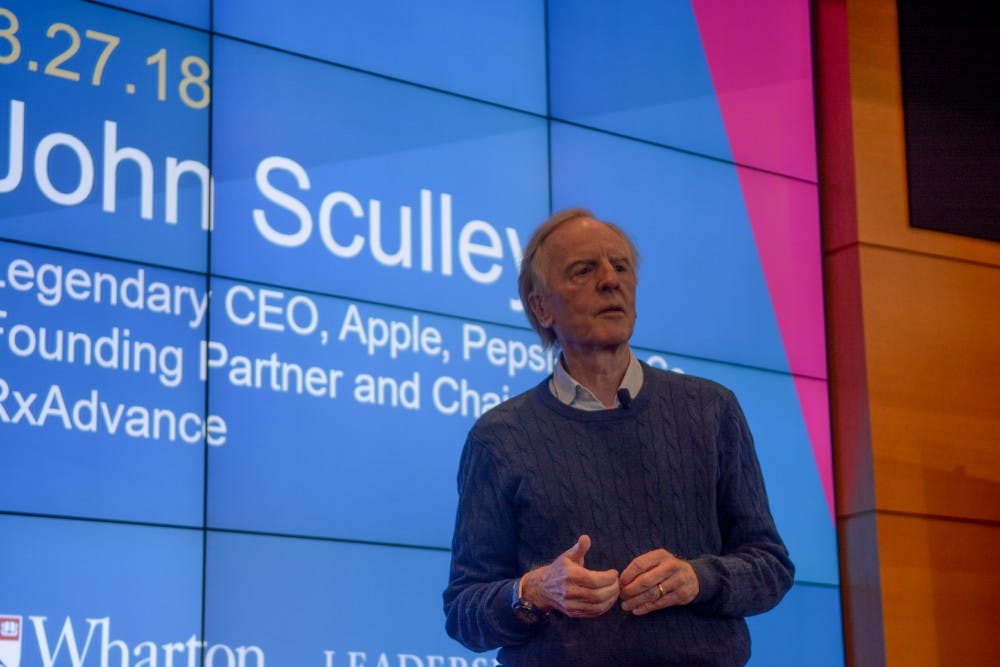Former Apple CEO and president of Pepsi-Cola visited Huntsman Hall to talk about the importance of innovation and disruption in any field.
A 1963 Wharton graduate, John Sculley spoke with Penn students about working as Apple CEO with Steve Jobs, his experiences as President of Pepsi-Cola, and disruption in the healthcare industry. Sculley now works in the healthcare industry as Chief Marketing Officer of RxAdvance.
The event was organized by Wharton Leadership Lectures as part of the McNulty Leadership Program.
Sculley spoke about the burgeoning personal computer industry in the 80s and his experiences working with Steve Jobs and Bill Gates.
“They absolutely believed in a cause. I was sitting there, listening to these two entrepreneurs, Steve and Bill, talking about an entirely new industry that had never existed before: the personal computer industry,” Sculley said.
Sculley remarked on the brilliance of the entrepreneurs, and made note of Jobs’s insatiable curiosity.
“What I’ve learned about people like Steve Jobs and Bill Gates is that what made them different...stemmed from a foundation of curiosity,” Sculley said.

Related:
Wharton drops to No. 3 spot for best MBA program in latest U.S. News rankings
The first-ever M&T Summit kicks off asking, 'What's more important than health care?'
Amazon, JPMorgan Chase, Berkshire Hathaway to create healthcare system to combat crisis
Sculley worked with Jobs as Apple CEO from 1983 to 1993, after Jobs asked Sculley, “Do you want to sell sugar water for the rest of your life or come with me and change the world?” Before joining Apple, Sculley had been vice president and president of Pepsi-Cola and oversaw the Pepsi Challenge.
For the Pepsi Challenge campaign, consumers were encouraged to take a sip of unlabeled Pepsi and Coca-Cola and decide which of the two they preferred.
“With the blind taste test, there was a slight margin of preference for Pepsi over Coke. It wasn’t about us saying that our product was better. We switched it to the experience.”
College and Wharton sophomore Nathan Chiu, a Coke fan, talked about how Sculley offered a different perspective on the cola wars.
“It was refreshing to hear from someone in the beverage industry. I’ve heard the Coke side of the challenge, but never the Pepsi side of the story I was curious to see what kind of strategies they had employed, and to see the people behind it,” Chiu said.
The Pepsi Challenge, Sculley said, was a venture in experience marketing, which allows consumer perception and experience to shape a company’s brand. Nowadays, with the consumer-marketing landscape changing, digital and tech giants had begun to rely heavily on experience marketing tactics. One examples, Sculley said, is Amazon Prime.
“Amazon Prime’s one of the most brilliant concepts of experience marketing. The experience branding is Amazon’s discovery of what you’re interested in, its predictions, the amount of time between your order to getting the product," Sculley said. "All of those things are part of the experience. That’s the world we live in today. Experience marketing."
Wharton Leadership Lectures are free events for the Wharton community that invite senior executives from the public and private sectors to discuss leadership and share insights. Past notable speakers include Shazam CEO Rich Riley, Wells Fargo CMO Jamie Moldafsky, and president of the Rockefeller Foundation and former Penn President Judith Rodin.
Sculley said he continues to disrupt his current field of work, the healthcare industry, which he calls "completely unsustainable."
"In healthcare, there’s no way you can make the US healthcare sustainable without solving the problem of how do we deliver healthcare in a more efficient way to the most expensive patient—the chronic care patient," Sculley said. "I focus on the pharmaceutical part of the health spend."
Sculley ended with encouraging advice to the audience.
“The exciting thing is, if you have the curiosity, if you’re willing to look at the facts differently, the opportunities that you have in your working life time may even be crazy enough to still want to work when you’re my age.”



